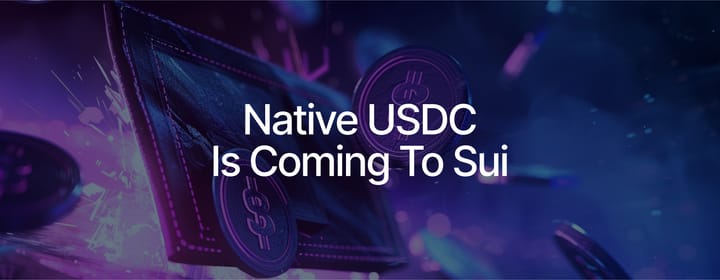Build Beyond: The Secret to Great Web3 Products
A conversation with Mysten Labs CEO Evan Cheng on ownership, trust, and building products consumers want

We recently sat down with Evan Cheng, Co-founder and CEO of Mysten Labs, to discuss the value of Web3 technology for consumers, how the industry can explain it better, and how it impacts product development.
You have spoken about Web3 as an experiment in ownership and how this new technology might change consumer behavior. Can you elaborate a bit on this view?
It comes down to who controls the assets we all produce. Everything we do actually produces something of value on the internet. And if you see what happens in what we call Web2, a lot of platforms, they basically build a business on how they distribute the content produced by their consumer, either intentionally or unintentionally.
Just look at Twitter. The tweets themselves are content but the relationships between people can actually be leveraged as an asset as well. So I think most consumers aren’t even aware they have assets with value and they are essentially being monetized.
The platform is basically a two-way marketplace, right? They are the middlemen that bring consumers to people who produce content. And that’s fine. There is a need for a platform or marketplace. In fact, the internet should help create this, to allow everyone to be able to create a marketplace efficiently. It equals the playing field. You don’t have to be a big player to have a soap box.
But the reality is that centralization and the associated network effects gave these platforms all the control and power. They are the content distributor and therefore they can squeeze all the profit out of that interaction. So it’s unfair. It’s no longer coordination between the creator, consumer, and the platform or seller. It’s more that the seller controls everything. And we see this repeated over and over again, in every type of business. It’s always the middlemen that have control. They are the ones that profit the most and unless people are aware this is happening, you’re not going to change that. Even with awareness you have an uphill battle to fight against it. We see that issue with Ticketmaster. We see the issue within our own industry with NFT marketplaces who decide it’s not in their interest to honor royalties.
To come back to your question, if I’m holding on to my asset, and I have control over how it’s being used, who can use it, and I have a way of transferring or sharing ownership that I can control, then I am less reliant on the middlemen, the platforms. That fundamentally changes the dynamic and shifts the power. So this is why in Web3, everything comes down to assets, ownership, and distribution of ownership because you want to move the manipulation of your assets, your ownership, to a piece of code like a smart contract.
Smart contracts are neutral. They don’t have feelings. They can be designed to make a profit. But once the design is transparent and unchangeable, you don’t have to worry about it becoming a bad actor.
Can you share some examples of bad actors and how Web3 can help?
You can see middlemen taking advantage of their users everywhere. With the Instagrams and YouTubes of the world, you understand how that works perfectly. But look at things beyond that, say supply chains or security assets or even real estate, this problem exists for all kinds of assets. There’s always rent seeking going on. There’s always a reason for someone in the middle to try and extract value from a transaction.
If you buy a house, you see how many pieces of paper you’re signing. You might wonder, “Why am I paying a fee to the title company or other agencies?”? Think about structured financing or any kind of supply chain. You see things go from people planting the coffee beans to making that cup of coffee. How many people in the middle are extracting value? There’s something very wrong with this.
So product builders and creators of content and goods are rightly concerned. Not only do they want to cut out the middleman in terms of transfers and transactions, they want to have a direct relationship with users. But currently all profits are just flowing to the top of the food chain. Right now, Apple basically serves a tax on everything that happens on the internet because they take 30% from apps and restrict what they can do. In turn, the apps end up passing that tax on to everyone else.
The only way to get out of this cycle is to take control of the asset itself and build a relationship between producer and consumer that doesn’t depend on middlemen. A relationship that can not be impacted by any kind of change in policy. So that’s what Web3 is about.
I remember learning that in banking so much of it is information arbitrage. But with a smart contract, it’s transparent. There’s less room for the intermediary or centralized figure.
Another great arbitrage example is trust. People trust you, the platform, perhaps on the basis of your brand, your policies, your regulations, or compliance. You supply trust, you’re the middleman, you take a cut. But if you move that trust to a piece of software that is governed by a lot of parties, where the trust is distributed, then this dynamic fundamentally changes.
People in Web3 often talk about ushering in “the next billion users.” Media outlets seem to be waiting with bated breath for a Web3 product with true mass adoption. What do you think needs to happen for us to get there?
For the past 10 years, a lot of people have been making money by packaging up technologies that don’t actually solve problems. So to get through to that everyday user, it’s important to have a new kind of product experience that’s better for them, where they actually understand the benefit of decentralization and having more control over their own assets. In ways that actually are easy for them to grasp.
You can’t keep on talking about decentralization because people don’t understand it. But you can talk about the fact you will no longer have to trust a centralized authority. Talk about the fact you can trust a piece of code that runs on technology controlled by many entities rather than one. That education is important, but the product experience is far more important. Because without actually experiencing the benefit, we can keep talking until we are blue in the face and it's not going to matter.
Ninety-nine percent of people don’t even know the internet is centralized and what that means to them. So you have to really change that. A lot of people talk about UI and UX. Yes, indeed, you have to think about removing friction points. But the most important thing, which hasn’t been addressed, is the benefit to consumers. And that goes back to what I said earlier. If you can show them what it really means when an intermediary isn’t placing a tax on you, you can show them the concrete benefit to them. Then behavior will change. Consumers will seek out those kinds of product experiences. And that’s how you can start the flywheel because it is really, really different conceptually for most people.
Beyond the removal of intermediaries and having more access and control of your data and assets, are there other values of decentralized tech that you think the regular consumer maybe doesn't recognize as the benefit of decentralized tech?
Yes, trust. Most people don’t trust what is happening in the media, in technology, in social media, everything. Trust, even for the government, has gone down tremendously. And I think this is a huge opportunity. Because fundamentally you can trust code when software is written in a way that’s transparent and proven to be correct. If you can get there, then that changes the game. If you have complete trust in a piece of software you interact with, that is going to change behavior. It will provide a lot more convenience.
Right now you kind of have to trust the Googles, Apples, and Facebooks of the world for login. They allow you to access services. But they can be hacked. Or a lot of other things can go wrong. If instead you can use a piece of code as a gateway to access services that require your identity, code that cannot be hacked and doesn’t carry any of your sensitive information, doesn’t even store any sensitive information, that can change things tremendously.
How do you think the industry needs to communicate this value? That decentralized tech offers things that people want, people just don’t realize they could have it with different technology.
Well, my answer might be controversial. I think much of the industry doesn’t understand it. Some people may have an intuition. People understand it but can’t articulate it very well.
This industry hasn’t explained the value of Web3 well. The only thing people really talk about is “read, write, own.” But nobody has done a good job explaining what the heck they mean by “own.” Your average person thinks “Why do I want to own this thing? I am perfectly happy trusting Instagram with my photos. I’m perfectly happy trusting YouTube with my videos. I’m perfectly happy trusting the video game company with the things I have received from my time and effort.” They need to understand the value of ownership.
Plus there are a lot of bad actors - scammers and those that want to get rich quick. They seem to outnumber the good actors in the space by quite a tremendous amount. The environment we’re in right now is noisy and terrible.
Right, we’re not educated enough to know the difference between trusting Google or another large tech company with their black box of code and the code in a smart contract which was also written by people. But actually, decentralized tech is designed so that code is not only transparent but private information is not actually meaningful or valuable to a smart contract the way it is valuable to a centralized tech company.
Yeah, it’s important. It’s not only that the code is trustworthy because it’s transparent but also they usually don’t hold onto your asset. Their job is to facilitate but they don’t hold onto it which is very different from a centralized model where you are giving your information, your data, your photo, your videos, whatever away and saying I trust you not to abuse it. And most companies don’t except of course they do extract value from it.
Right, and since they monetize your data, they’re going to hold on to it because having it available could be valuable.
And probably people don’t really get that the secondary effect is worse. Because when they have a lot of data they use that for antitrust behavior, use it as their moat to box out competitors. Because then their network effect is even bigger. They’re going to make sure competitors don’t have a means to attack them. So in turn the consumer pays more for their service or they get paid less for the products from these platforms. And that’s exactly the play Apple is doing.
I recently watched a presentation you gave for Digital Architecture Lab. In it, you stressed that in designing an L1 you need to start by thinking about what a developer wants to do, what sort of problem they want to solve, and the type of consumer experience they want to create and work backwards from there. Can you extend this philosophy to how app developers should look at their products when getting started in Web3?
In Web3, there’s a lot of people selling complexity as a solution that only solves one problem. You look at the entirety of basically all the roll ups, L2s, and all that is offered in the category, and they are solving one technical problem. And that’s the product, right?
When I talk about developers, I'm thinking about people who are building products and services for consumers and businesses. They want to abstract away the complexity. They want to translate their idea for a product or service into code that functions. So those companies are selling them the wrong thing.
A product developer shouldn’t repeat this when it comes to their consumer. Don’t pass the complexity on to the consumer. Right now we are seeing that left and right. Every Web3 product just adds a whole bunch of complexity that consumers shouldn’t have to deal with. Consumers have to think about paying gas. They have to think about the wallet experience. They have to think about how to extract value from their assets. It’s all wrong. Currently, a lot of Web3 products are just about figuring out how to extract money from the system.
For me, developers must understand behavior change. What do they want to enable? A lot of developers are acutely aware of the problems they are trying to solve. They wonder “How do I acquire customers? How do I engage with customers?” Well, now they have a platform that allows for a direct relationship with the people who will consume their services. So they need to figure out, “How do I use that? How do I engage them? How do I acquire them first? Do I give something away? Excite them about the opportunity? Do I sell them something and promise future benefits? And then once I have them, how do I keep them as a user?” That’s the thing builders should think about, the relationship between themselves and their consumers.
A lot of people talk about how Web3 has a UX problem. Do you agree with that statement?
I don’t agree. Bad UX is a surface level thing. Wanting to abstract away token management, or log in, or the wallet situation, it’s all surface level. Solving those issues doesn't really fundamentally solve the problem. At best it gets you on par with a Web2 product.
We saw that with Celsius and other lending apps. They are solving the UX problem by going back to centralization. Users put in their money and then the app deploys it to yield farming activities. Then they do all these things that lending companies do in the centralized world. That is not the way to think about the problem, right? You are not really building a differentiated product, you’re not actually solving the centralization problem. You’re going back to the same root problem.
There’s very little understanding of what consumers actually want or even what developers want. There isn’t a clear sense of the economic damage product policy changes, which are rooted in control, have on the developer and then are passed on to the consumers. So people think, it’s the UX being bad that is a barrier for adoption. But no, even if your app has the perfect UX, it still might not be solving any real problem for consumers.
Any final thoughts on how builders can make great products in Web3?
I think builders need to talk to consumers and learn about their pain points. And it really requires a mental model change. How do you turn something that’s centralized, where you have control, you provide trust, you facilitate an activity into a process that is more about coordination. Ultimately that is the hardest part. That’s the thing that hasn’t been proven, hasn’t been done. What does that actually look like?
Sui’s providing a building block, providing tools and examples of how to solve these kinds of problems. That is the mission. To help builders make truly useful products. So think about what you want to make and learn more about Sui. Work with Sui. Sui is here to help.



